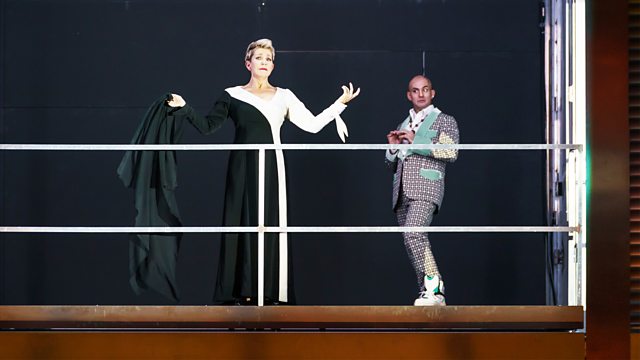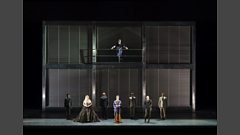
Handel's Agrippina
Handel's opera, Agrippina, starring Joyce DiDonato accompanied by the Orchestra of the Age of Enlightenment under Maxim Emelyanychev from the Royal Opera House, Covent Garden.
Handel's early masterpiece, Agrippina, is a gripping drama of high politics and low deceit set to some of the composer's most ravishing music. Agrippina is the first in a long line of fascinating female characters that Handel portrays with acute psychological depth, portraying both her magnetic charm and steely ambition. In this production by Barrie Kosky from the Roya Opera House, Covent Garden, Joyce DiDonato heads a cast of leading Handelian singers accompanied by The Orchestra of the Age of Enlightenment under Maxim Emelyanychev.
Presented by James Naughtie with guest Elin Manahan Thomas
Agrippina.....Joyce DiDonato (Mezzo-soprano)
Nerone.....Franco Fagioli (Countertenor)
Poppea.....Lucy Crowe (Soprano)
Ottone.....Iestyn Davies (Countertenor)
Claudio.....Gianluca Buratto (Bass)
Pallante.....Andrea Mastroni (Bass)
Narciso.....Eric Jurenas (Countetenor)
Lesbo.....Jose Coca Loza (Bass)
Orchestra of The Age of Enlightenment
Maxim Emelyanychev (Conductor)
Last on
More episodes
Music Played
-
![]()
Wolfgang Amadeus Mozart
Rondo in D major K.382
Performer: Murray Perahia. Orchestra: English Chamber Orchestra.- Sony.
Synopsis
Act I
Agrippina has great news for her son Nerone: Emperor Claudio, Agrippina’s husband and Nerone’s stepfather, is reported to have drowned in a storm on his journey back from Britain. The time has therefore come for Nerone to claim the throne. Agrippina instructs her son to walk among the people and to show humility, modesty and generosity. She then summons the freedmen Narciso and Pallante, one by one. Both were influential advisers at Claudio’s court and are in love with Agrippina. She promises each that she will reciprocate their love and even allow them to reign together with her if they will support Nerone. By means of Nerone’s coronation, Agrippina intends to secure her own influence .
��
Nerone distributes alms at the Capitol to shouts of acclamation from Narciso and Pallante. Agrippina joins in. However, Claudio’s servant Lesbo announces that the Emperor did not drown, but was snatched from the waters by the gallant Ottone. Ottone reports that Claudio promised him the throne in gratitude for his valiant deed. Agrippina is the only one to maintain her composure and congratulates the hero, who proceeds to request a private conversation. He professes his love for Poppea and declares that he would renounce the throne in order to be with her. Agrippina knows that Claudio, too is secretly in love with Poppea. She leads Ottone to believe that she will lend him her support.
��
Poppea is flattered by the declarations of love she has received from Ottone, Claudio and Nerone. Nobody knows her true plans and desires, though she in fact loves Ottone. Agrippina, with seemingly the best of intentions, warns Poppea about Ottone. She tells her that Ottone has promised Claudio that he can keep Poppea as his lover, in exchange for the crown and sceptre. Poppea is shocked, taking Agrippina at her word. Agrippina advises her to speak ill of Ottone to Claudio, as a means of avenging his deceit. Poppea expresses her sorrow to Claudio. She claims that Ottone, assured of becoming Emperor, has forbidden her to love Claudio. Furious, Claudio vows never to allow Ottone to become Emperor.
��
��
Act II
Narciso and Pallante feel betrayed by Agrippina. But they also fear the rage of Claudio, due to their support for Agrippina’s plan to make Nerone Emperor. They pledge to help each other. Together, they greet Ottone as the future Emperor. Ottone himself is only interested in Poppea, though she responds to him coldly. Agrippina’s suggestive whisperings cause Poppea’s anger towards Ottone to burn even more fiercely.
��
Following Claudio’s triumphal entrance, the Emperor, deeply moved, receives his subjects’ adulation. As Ottone steps forward and humbly requests the reward for his act of heroism, Claudio erupts in a fit of rage. He accuses Ottone of being a traitor deserving only death. Ottone, unable to comprehend what has befallen him, asks Agrippina Poppea and Nerone for help, then Pallante, Narciso and Lesbo for sympathy, but all walk away.
��
IPoppea takes pity on Ottone. She wishes to know how he will defend himself. As Ottone, vacant and downcast, passes by, she confronts him, as though talking in her sleep, and accuses him of conceding her to Claudio in return for the throne. Ottone protests his innocence to Poppea, now seemingly awake. Poppea hesitates; after all, it was Agrippina who gave her this information. Ottone is outraged at Agrippina’s unscrupulousness and begs Poppea to believe him. She tells him to visit her at night, when she will make her decision as to whether he is guilty. Poppea begins to see through Agrippina’s intrigues and vows to avenge her deception. Via Lesbo, she summons Claudio to her chamber for the night, and then invites Nerone to visit at the same time. Agrippina is tormented by gloomy thoughts. She regrets the trust she put in Narciso and Pallante and sees her plans jeopardized by Ottone’s and Poppeas virtue and courage.
��
Although she is anxious, she reacts with determination: First, she charges Pallante to kill Narciso and Ottone, before instructing Narciso to murder Pallante and Ottone. Both appear to agree to her request. Agrippina now appeals to Claudio’s conscience. She suggests that his life will be under threat; Ottone is lamenting the injustice done to him, and may stir up others against Claudio. Only the immediate naming of a new Emperor can put an end to Ottone’s machinations, and loyal Nerone would be the most suitable choice. Claudio hesitates at first, but, urged to leave by Lesbo, promises to hand over the throne to Nerone. He hastily departs. Satisfied, Agrippina reaffirms her pledge to risk everything for the sake of her mission.
��
Act III
Poppea and Ottone are happily reunited; Ottone has convinced his beloved of his innocence. Poppea announces her plan to take revenge on Agrippina for her scheming. Ottone hides, and Nerone enters. Poppea declares her love for him, but urges him to also hide himself, under the pretext that Agrippina’s arrival is imminent. When Claudio instead appears, Poppea clarifies a supposed misunderstanding, namely that it is not Ottone, but Nerone who has bothered her. In order to prove Nerone’s guilt she leads Claudio to his hiding place. Claudio is enraged and chases Nerone away. Once Poppea has persuaded Claudio to leave, she and Ottone declare their love for one another. Nerone informs Agrippina what has happened. She accuses him of jeopardizing their mutual endeavour for the sake of blind passion. Nerone admits his mistake, but adds that Poppea has already seen through Agrippina’s plot. Agrippina, reaffirms her hope and singular aim to put Nerone on the throne. Nerone’s love for Poppea grows cold as a result of his rage at her betrayal. Narciso and Pallante inform the Emperor of Agrippina’s machinations. When Agrippina urges Claudio to fulfil his promise, he confronts her. Agrippina calmly explains that Narciso and Pallante were witnesses to her honourable actions: She had wanted to name Nerone Emperor simply to prevent the kingdom from falling into the wrong hands. Yet, when Claudio returned, she had submitted to him gladly and immediately. Taken by surprise, the freedmen confirm Agrippina’s version of events.
��
Agrippina now begins to accuse Poppea of treachery, but is interrupted by Poppea‘s arrival, together with Nerone and Ottone. Claudio wishes to resolve the general disorder and have peace. He decrees that Nerone and Poppea should marry and that Ottone should become Emperor. The concerned parties declare themselves wholly dissatisfied with this solution. In response, Claudio states that his suggestion was merely a test of their true desires and revises his decision: Nerone is to become Emperor; Ottone and Poppea shall be allowed to marry. Everyone is happy, yet none more than Agrippina: ‘Now that Nerone is Emperor, I will die content’.
Broadcast
- Sat 19 Oct 2019 18:30����ý Radio 3


